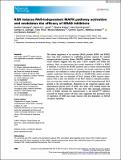Por favor, use este identificador para citar o enlazar a este item:
http://hdl.handle.net/10261/288877COMPARTIR / EXPORTAR:
 SHARE SHARE
 CORE
BASE CORE
BASE
|
|
| Visualizar otros formatos: MARC | Dublin Core | RDF | ORE | MODS | METS | DIDL | DATACITE | |

| Título: | KSR induces RAS-independent MAPK pathway activation and modulates the efficacy of KRAS inhibitors |
Autor: | Paniagua, Guillem; Jacob, Harrys K.C.; Brehey, Oksana; García-Alonso, Sara; Lechuga, Carmen G.; Pons, Tirso CSIC ORCID ; Musteanu, Mónica; Guerra, Carmen CSIC; Drosten, Matthias CSIC ORCID; Barbacid, Mariano CSIC | Palabras clave: | ATP binding KRASG12C MAPK pathway RAS-independent proliferation Resistance Sotorasib |
Fecha de publicación: | sep-2022 | Editor: | John Wiley & Sons | Citación: | Molecular Oncology 16: 3066-3081 (2022) | Resumen: | The kinase suppressor of rat sarcoma (RAS) proteins (KSR1 and KSR2) have long been considered as scaffolding proteins required for optimal mitogen-activated protein kinase (MAPK) pathway signalling. However, recent evidence suggests that they play a more complex role within this pathway. Here, we demonstrate that ectopic expression of KSR1 or KSR2 is sufficient to activate the MAPK pathway and to induce cell proliferation in the absence of RAS proteins. In contrast, the ectopic expression of KSR proteins is not sufficient to induce cell proliferation in the absence of either rapidly accelerated fibrosarcoma (RAF) or MAPK-ERK kinase proteins, indicating that they act upstream of RAF. Indeed, KSR1 requires dimerization with at least one member of the RAF family to stimulate proliferation, an event that results in the translocation of the heterodimerized RAF protein to the cell membrane. Mutations in the conserved aspartic acid–phenylalanine–glycine motif of KSR1 that affect ATP binding impair the induction of cell proliferation. We also show that increased expression levels of KSR1 decrease the responsiveness to the KRASG12C inhibitor sotorasib in human cancer cell lines, thus suggesting that increased levels of expression of KSR may make tumour cells less dependent on KRAS oncogenic signalling. | Versión del editor: | http://dx.doi.org/10.1002/1878-0261.13213 | URI: | http://hdl.handle.net/10261/288877 | DOI: | 10.1002/1878-0261.13213 | Identificadores: | doi: 10.1002/1878-0261.13213 issn: 1878-0261 |
| Aparece en las colecciones: | (IBMCC) Artículos (CNB) Artículos |
Ficheros en este ítem:
| Fichero | Descripción | Tamaño | Formato | |
|---|---|---|---|---|
| KSR induces RAS-independent_Paniagua_PV_Art2022.pdf | 1,93 MB | Adobe PDF |  Visualizar/Abrir |
CORE Recommender
SCOPUSTM
Citations
10
checked on 14-may-2024
WEB OF SCIENCETM
Citations
7
checked on 23-feb-2024
Page view(s)
39
checked on 14-may-2024
Download(s)
37
checked on 14-may-2024
Google ScholarTM
Check
Altmetric
Altmetric
Este item está licenciado bajo una Licencia Creative Commons

